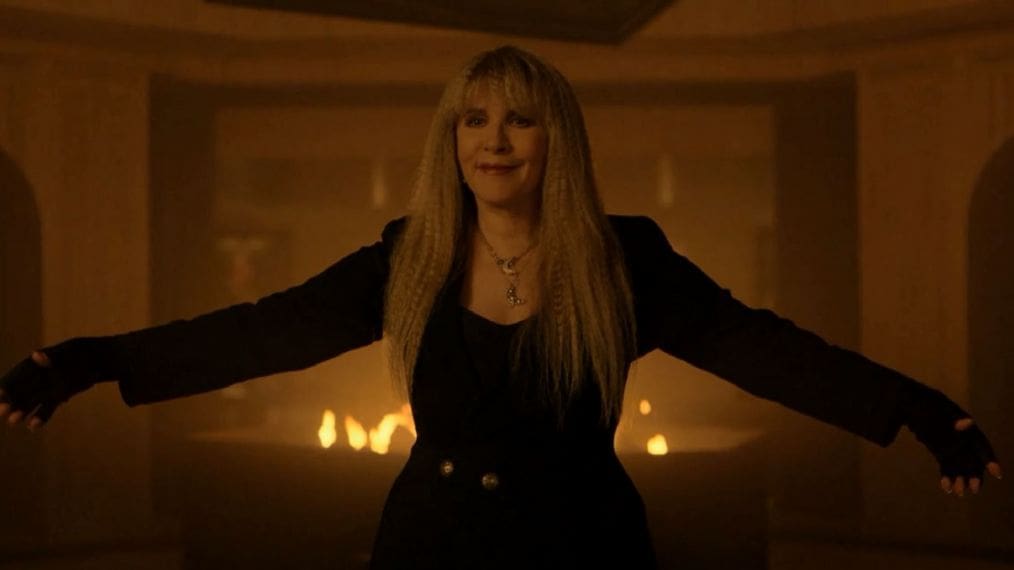
Ryan Murphy productions have never really been subtle, but American Horror Story: Apocalypse really seems to be throwing subtlety and restraint out the window. “Boy Wonder” is a strange combination of horror, high-concept fantasy, political allegories, and extreme violence that features all of its showrunner’s best and worst traits. Yet, somehow, it remains compulsively watchable – moreso than the series has been in years.
This week’s installment — an extended flashback — finds the Warlock Academy pushing Cordelia (the “f*cking Supreme”) to give Michael the Test of the Seven Wonders. If he succeeds, Cordelia would, of course, have to give up her title, a fact that worries the Coven. But Cordelia has other concerns: namely, a vision she had of the end of the world, in which her pupils were dead and a mysterious, white-faced demon leads a pack of mutants to kill her. She’s concerned that her stubborness to hold on to her title will lead to the end of the world (even though the white faced demon is quite clearly Michael but, whatever, we’ll stretch our imagination).
The Warlocks’ campaign to push Michael into the position of the Supreme has clear political overtones, with their dialogue about reclaiming their position of power from the witches calls to mind the slogans we see Men’s Rights Activists repeating on forums and social media sites. It’s far from subtle, but strangely effective. Since American Horror Story was berthed as a way for its writers to explore “real” social horrors through a genre lens, it’s nice to see the show integrating real problems into the actual story, instead of making it the actual story (i.e. Cult).
Apocalypse also seems to have fully embraced camp as its tone of choice, with virtually every actor chewing scenery while donning outfits that are as impractical as they are stunning. But this leads to some of the episode’s best moments. Frances Conroy, always a highlight of the series, delivers a hilarious monologue about problematic men in positions of power, which rings true even though it’s also clearly played for laughs. The show also cheekily evokes silent films (and a similar sequence in Season 3), which supplies some great visual gags. But the real highlight of the episode is Billy Porter, who audiences will remember as Pray-Tell from FX’s Pose this summer. He is clearly having the time of his life as a warlock named Behold, who can talk at a mile a minute and deliver some brutal one-liners. Next week hints that Behold will team up with a fellow master of reading their enemies, Madison Montgomery. Now that’s something to look forward to.
But, in typical Ryan Murphy fashion, Apocalypse doesn’t quite know when to call it quits. The series is just juggling far too many characters, and killing them off so quickly that we fail to ever really get invested. This week, a seemingly significant character (played by an AHS regular) was unceremoniously killed off, ending a subplot that took up quite a bit of time for apparently no real reason. Meanwhile, the episode ends with an extended musical performance from Stevie Nicks (you’ll remember, she’s a witch in this universe). While hearing Nicks sing one of her classics is always a pleasure, it just feel silly and unnecessary in the final moments. FX episodes already feel somewhat bloated — we don’t need an extra musical number. Give us more meaningful story.
American Horror Story has been such a roller coaster ever since its first season — why should a season that basically amounts to The Avengers of AHS be any different? But, as wildly uneven as these episodes can be, they are at least always fun! That’s something that has not been true of the past few seasons of American Horror Story. So, as long as Apocalypse keeps the entertainment value high (something which seems likely as Jessica Lange returns to the series next week), this season will be a minor hit for the long-running anthology.
Overall rating: 6 out of 10

